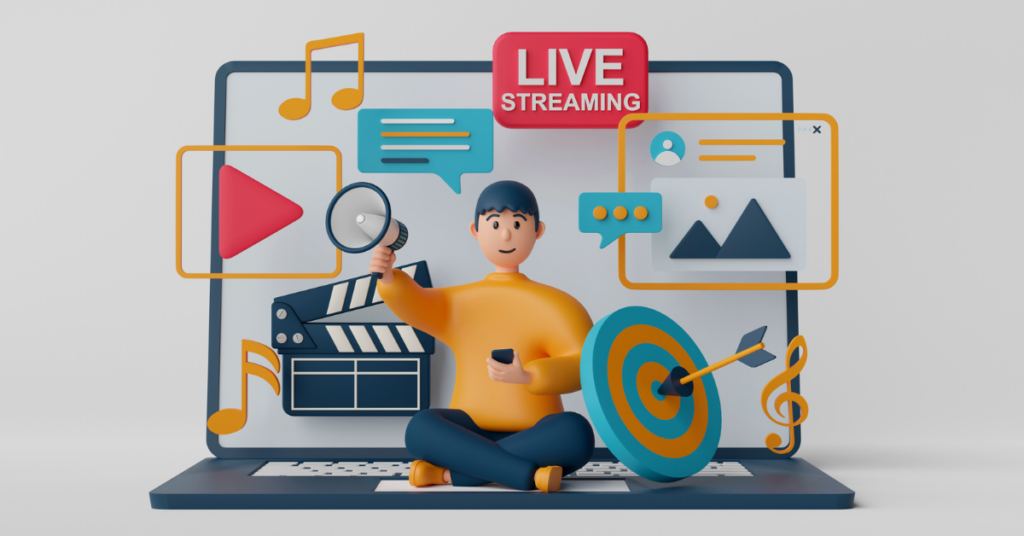
What Is B2B Marketing: Definition, Strategy, and Trends
B2B (business-to-business) marketing is an intricate dance of strategies and tactics designed to sell products or services from one buyer or one business to another. The heart of this approach lies in understanding the unique needs, challenges, and decision-making processes of businesses. In recent years, the landscape has witnessed a paradigm shift with video content taking center stage. This dynamic medium allows businesses to convey complex ideas with ease, establishing emotional connections and elevating the overall impact of marketing efforts. Video content is no longer a mere supplement but a cornerstone in the B2B marketing realm, fostering engagement and facilitating effective communication.
B2B Marketing Strategies: The B2B Marketing Process Explained
B2B marketing success is contingent upon a well-defined strategy aligned with the unique dynamics of business interactions. This segment intricately dissects the core strategies employed in B2B and marketing campaigns, emphasizing the importance of a comprehensive marketing process. Video content, when strategically woven into this process, serves as a dynamic medium to introduce products, showcase expertise, and guide potential clients through the decision-making journey. From informative explainer videos to engaging webinars, the versatility of video enhances the effectiveness of B2B marketing strategies.
The 6 Differences Between B2B and B2C Marketing
B2B and B2C (business-to- business to business transactions to-consumer) marketing are distinct approaches with unique dynamics shaped by the nature of their target audiences. Understanding the key differences between these two realms is essential for crafting effective marketing strategies. Here are the six fundamental distinctions:
- Audience Complexity:
- B2B: The B2B audience typically involves multiple decision-makers within a business structure. Purchases are often based on rational decision-making, with an emphasis on the long-term benefits and ROI (Return on Investment).
- B2C: B2C marketing usually targets individual consumers. Purchase decisions are often more emotional, driven by personal preferences, desires, and immediate needs.
- Purchase Volume and Frequency:
- B2B: B2B transactions generally involve larger volumes and less frequent purchases. The sales cycle is typically longer as businesses carefully evaluate and negotiate terms before committing to significant investments.
- B2C: B2C transactions tend to have lower individual transaction values but higher frequency. Consumers make more frequent, often impulsive, purchases driven by personal preferences and immediate needs.
- Decision-Making Process:
- B2B: B2B purchases often involve a structured decision-making process with input from various departments. The decision-making journey is characterized by research, analysis, and consensus-building among key stakeholders.
- B2C: B2C decisions are often quicker and more straightforward. Consumers usually make purchase decisions independently, influenced by factors such as advertising, reviews, and personal experiences.
- Content Complexity:
- B2B: Content in B2B marketing is typically more detailed and focused on educating the audience. Whitepapers, case studies, and in-depth product demonstrations are common to address the complex needs and considerations of businesses.
- B2C: B2C content tends to be more visually appealing and emotionally driven. Marketers often utilize storytelling, lifestyle imagery, and concise messaging to capture the attention of individual consumers.
- Relationship Focus:
- B2B: B2B marketing places a strong emphasis on building long-term relationships. The focus is on establishing trust, providing ongoing support, and delivering value over an extended period.
- B2C: While building brand loyalty is important in B2C, relationships are often more transactional. Consumers may switch brands more readily based on factors such as price, convenience, or trends.
- Marketing Channels:
- B2B: B2B marketing often relies on personalized, direct outreach through channels like email, industry events, and targeted advertising. Relationship-building is facilitated through one-on-one interactions and a focus on expertise and industry knowledge.
- B2C: B2C marketing leverages a broader range of channels, including social media, influencer marketing, and mass advertising. The goal is to reach a large audience and create broad brand awareness.
Understanding these differences is crucial for marketers to tailor their strategies effectively, ensuring that the unique characteristics of B2B or B2C transactions are addressed in their ads in a manner that resonates with their target audience.
Invest in B2B Marketing and Reach Your Business Customers
Investing in B2B marketing is an investment in the growth and sustainability of a business. This section underscores the significance of allocating resources judiciously to reach and engage business customers effectively. Video content, for example, with its capacity to convey authenticity and showcase the human side of a business, emerges as a strategic asset. It provides a visually compelling medium to communicate complex messages, demonstrate the value of products or services, and ultimately build lasting relationships with discerning business clients.
Create a B2B Marketing Plan and a Marketing Strategy: Cover All of Your B2B Marketing Bases, Such as Launching a Website
Developing a robust B2B marketing plan is a multifaceted process that demands meticulous planning and a profound understanding of the target audience. This comprehensive strategy not only outlines the goals and tactics but also establishes a roadmap for effective implementation. A well-crafted plan begins with thorough market research to identify industry trends, analyze competitor strategies, and pinpoint the unique needs of the B2B audience. This insight forms the foundation upon which the marketing plan is built, ensuring that every component is tailored to resonate with the specific challenges and preferences of businesses.
A pivotal element of a successful B2B marketing plan is the creation of a dynamic and user-centric website, positioned as a central hub for all marketing efforts and social media channels. The website serves as the digital face of the business, acting as the primary point of interaction for potential clients. It’s not merely an online presence but a strategic tool that can significantly impact brand perception and audience engagement. To enhance the user experience and captivate the attention of business clients, the integration of video content proves instrumental.
Video content, when strategically embedded into the website, brings the brand to life with impactful storytelling and immersive product demonstrations. These videos serve as compelling visual narratives that resonate with the business model target audience, conveying complex ideas in a format that is both engaging and easily digestible. Whether introducing the company’s origin story, showcasing the intricacies of products or services, or highlighting client success stories, video content establishes an emotional connection and fosters a sense of trust.
Furthermore, the strategic placement of video content on the website ensures that visitors receive a well-rounded understanding of the brand, its values, and the solutions it offers. This multimedia approach not only caters to diverse learning preferences but also leaves a lasting impression on potential buyers and clients. As businesses navigate the website, the incorporation of video acts as a guide, steering them through a visually rich and informative journey that aligns with the broader narrative of the brand.
In essence, launching a website as the focal point of a B2B digital marketing and plan, coupled with the strategic integration of video content, transforms the digital presence into a powerful storytelling platform. This approach enriches user engagement, effectively communicates brand messages, and ultimately positions the business as a trusted and innovative partner in the eyes of potential clients. As businesses evolve in the digital landscape, a well-executed website supported by captivating video content becomes an indispensable asset in achieving marketing objectives and driving success in the competitive B2B market.
B2B Marketing Tactics and Content Formats: 5 Examples of Strategies for Effective B2B Marketing
Executing effective B2B social media marketing often demands a diversified arsenal of tactics and content formats. This portion goes beyond theory, presenting five exemplary strategies that harness the power of video content for maximum impact. From educational videos that elucidate product capabilities to customer testimonial videos that build trust, businesses can employ a variety of video formats strategically. Each format serves a unique purpose, addressing different stages of the B2B marketing funnel and ensuring a cohesive and compelling narrative that resonates with the target audience.
Crafting effective B2B marketing strategies requires a nuanced approach that aligns with the unique dynamics of business interactions. Here are five examples of strategies that can elevate your company in B2B marketing efforts:
- Educational Video Series:
- Develop a series of educational videos that delve into industry trends, common challenges, and innovative solutions. These videos can position your business as an industry authority, providing valuable insights to your B2B audience. Whether it’s explaining complex processes, sharing success stories, or offering expert interviews, educational videos establish credibility and build trust.
- Customer Testimonial Campaigns:
- Leverage the power of your satisfied customers by creating compelling testimonial campaigns. Feature case study videos or written testimonials that highlight real-world successes and the tangible benefits your products or services bring to businesses. Authentic endorsements from existing clients serve as powerful social proof, instilling confidence in potential B2B customers and influencing their decision-making process.
- Interactive Webinars and Workshops:
- Host interactive webinars or virtual workshops that address key pain points within your industry. These sessions can provide in-depth knowledge, practical solutions, and opportunities for direct engagement with your target audience. Incorporate live Q&A sessions, polls, and interactive elements to foster meaningful discussions and showcase your expertise.
- Strategic Content Partnerships:
- Collaborate with complementary businesses in your industry to create mutually beneficial content partnerships. This could involve co-authoring whitepapers, hosting joint webinars, or participating in shared thought leadership initiatives. By combining resources, you can expand your reach, tap into new audiences, and establish your brand as part of a collaborative and forward-thinking ecosystem.
- Personalized Email Campaigns:
- Implement targeted and personalized email campaigns tailored to specific segments of your B2B audience. Utilize data-driven insights to send relevant content, product updates, or exclusive offers based on the recipient’s needs and preferences. Personalization enhances engagement and demonstrates a keen understanding of your customers’ unique challenges, fostering stronger connections.
Remember to integrate these strategies into a cohesive and data-driven B2B marketing plan. By combining educational content, customer testimonials, interactive sessions, strategic partnerships, and personalized outreach, businesses can create a robust marketing approach that resonates with their target audience and drives meaningful results.
Sign Up to B2B Marketing Guides, Resources, and Webinar Updates
In the rapidly evolving realm of B2B marketing, staying informed is crucial for sustained success. Key platforms from companies like HubSpot Academy, LinkedIn Marketing Solutions, B2B Marketing Exchange, MarketingProfs, B2B Marketing, Content Marketing Institute (CMI), and Google Analytics Academy offer invaluable guides, resources, and webinar updates tailored for B2B marketers. By subscribing to these platforms, professionals can access a wealth of knowledge, stay ahead of industry trends, and refine their strategies to navigate the competitive B2B landscape successfully.
Explore these resources for continuous learning and innovation:
- HubSpot Academy
- LinkedIn Marketing Solutions
- B2B Marketing Exchange
- MarketingProfs
- B2B Marketing
- Content Marketing Institute (CMI)
- Google Analytics Academy



















